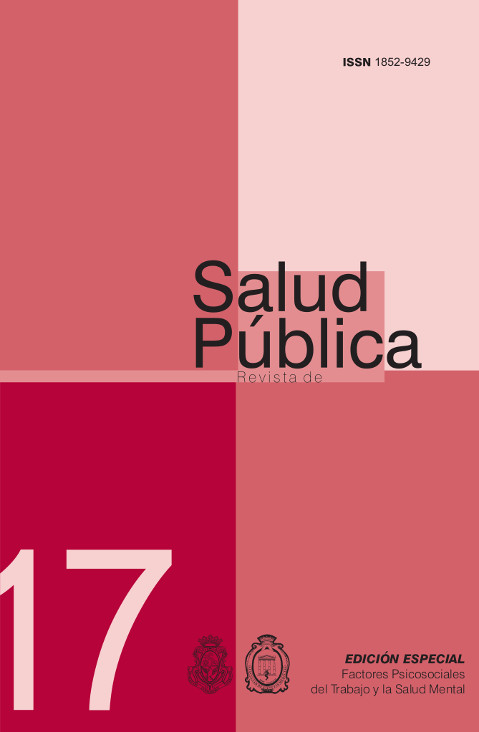MENTAL HEALTH AND PSYCHOSOCIAL FACTORS IN JOB IN TEACHERS OF PRIMARY SCHOOL, AND ACADEMIC ACHIEVEMENT OF THEIR STUDENTS
DOI:
https://doi.org/10.31052/1853.1180.v0.n0.16781Keywords:
Teaching, mental health, workers healthAbstract
Abstract The objective of this study was to establish the relationship between the mental health of teachers and the results of their students in standardized tests. A study was carried out with a mixed design, with a qualitative and a quantitative component; the first consisted of interviews with managers and teachers; while the second involved a survey of 189 teachers about psychosocial risk factors at work, life satisfaction, psychological distress, Burnout Syndrome, and the prevalence of mental disorders. The results show that the psychological demands(OR = 2,12 [1,06 – 4,22]), p < 0,005), the social support at work and the quality of the leadership(OR = 2,09 [0,98 – 4,47]), p 0< 0,005), are important factors of the academic results of the students. However, teachers ‹mental health indicators did not show a relevant effect, so it is necessary to continue with the study of school climate, mental health and the effects on learning.
Downloads
References
1. Cuenca R, Fabara Garzón E, Kohen J, Parra Garrido M, Rodríguez Guzman L, Tomasina F. Condiciones de trabajo y salud docente: estudios de casos en Argentina, Chile, Ecuador, México, Perú y Uruguay. UNESCO; 2005. 73-100 p.
2. Cornejo R, Quiñónez M. Factores asociados al malestar/bienestar docente. Una investigación actual. REICE Rev Electrónica [Internet]. 2007 [cited 2016 Dec 14]; Available from: https://repositorio.uam.es/handle/10486/661066
3. Kohen J. Salud y trabajo docente elemnetos teóricos metodológicos de la investigación al monitoreo epidemiológico. Salud trab(Maracay) [Internet]. 1999 [cited 2016 Dec 14]; Available from: http://bases.bireme.br/cgi-bin/wxislind.exe/iah/online/?IsisScript=iah/iah.xis&src=google&base=LILACS&lang=p&nextAction=lnk&exprSearch=401964&indexSearch=ID
4. Valdivia G, Avendaño C, Bastías G, Morales A, Scharager J. Estudio de la salud laboral de los profesores en Chile. 2003.
5. Silva C, Quintana R, Reyna D. Nivel de estrés en docentes de enseñanza básica en Chillán-Chile. Enfermería en Costa Rica. 2005;26(1):5–12.
6. Maslach C. Job burnout: new directions in research and intervention. Curr Dir Psychol Sci [Internet]. 2003 [cited 2016 Dec 16]; Available from: http://www.ingentaconnect.com/content/bpl/cdir/2003/00000012/00000005/art00009
7. Faúndez V, Gil-Monte P. Análisis de las principales fortalezas y debilidades del “Maslach Burnout Inventory”(MBI). Cienc Trab [Internet]. 2009 [cited 2016 Dec 14]; Available from: http://190.98.232.14/cyt/EdicionesAnteriores/Volumen 33.pdf#page=62
8. Quiñones M, Van den Broeck A. Burnout en profesores. de Salud Pública [Internet]. 2012 [cited 2016 Dec 14]; Available from: http://www.revistaderechopublico.uchile.cl/index.php/RCSP/article/viewArticle/23126
9. Fisher M. Factors influencing stress, burnout, and retention of secondary teachers. Curr issues Educ [Internet]. 2011 [cited 2016 Dec 14]; Available from: http://cie.asu.edu/ojs/index.php/cieatasu/article/viewArticle/658
10. Goddard R, O’Brien P, Goddard M. Work environment predictors of beginning teacher burnout. Br Educ Res [Internet]. 2006 [cited 2016 Dec 14]; Available from: http://www.tandfonline.com/doi/abs/10.1080/01411920600989511
11. Bagceci B, Hamamci Z. An Investigation into the Relationship between Burnout and Coping Strategies among Teachers in Turkey. Int J Humanit Soc Sci. 2012;2(12).
12. Tomic W, Evers W, Brouwers A. Existential fulfillment and teacher burnout. 2004 [cited 2016 Dec 14]; Available from: http://dspace.ou.nl/handle/1820/1226
13. Skaalvik E, Skaalvik S. Teacher self-efficacy and teacher burnout: A study of relations. Teach Teach Educ [Internet]. 2010 [cited 2016 Dec 14]; Available from: http://www.sciencedirect.com/science/article/pii/S0742051X09002479
14. Asun D, Molina D, Real C. Burnout en educacion. 2002.
15. Treviño E, Place K, Gempp R. ANALISIS DEL CLIMA ESCOLAR. 2012;
16. Alvarado R, Pérez-Franco J, Saavedra N. Validación de un cuestionario para evaluar riesgos psicosociales en el ambiente laboral en Chile. Rev médica [Internet]. 2012 [cited 2016 Dec 16]; Available from: http://www.scielo.cl/scielo.php?script=sci_arttext&pid=S0034-98872012000900008
17. De la Revilla Ahumada L, De los Ríos Álvarez AM, Luna del Castillo JD. Utilización del Cuestionario General de Salud de Goldberg (GHQ-28) en la detección de los problemas psicosociales en la consulta del médico de familia. Atención Primaria. 2004;33(8):417–25.
18. Lobo A, Muñoz P. Cuestionario de Salud General GHQ - Guía para el usuario.pdf. Barcelona: Masson; 1996. 186 p.
Revista de Salud Pública, (ed. especial) :37-50 Marzo 201750PIÑOL ARRIAGADA D., ALVARADO MUÑOZ R., VALDIVIA MATUS L., SILVA ZAMORA C., CONTRERAS ROJAS P.. / Salud...
19. Diener E, Oishi S, Lucas R. Personality, culture, and subjective well-being: Emotional and cognitive evaluations of life. Annu Rev Psychol [Internet]. 2003 [cited 2016 Dec 16]; Available from: http://www.annualreviews.org/doi/abs/10.1146/annurev.psych.54.101601.145056
20. Kessler R, Üstün T. The world mental health (WMH) survey initiative version of the world health organization (WHO) composite international diagnostic interview (CIDI). Int J methods [Internet]. 2004 [cited 2016 Dec 16]; Available from: http://onlinelibrary.wiley.com/doi/10.1002/mpr.168/full
21. Corvalan MI. La realidad escolar cotidiana y la salud mental de los profesores. Rev enfoques Educ. 2005;7(1):69–79.
22. Arón AM, Milicic N. Desgaste profesional de los profesores y clima social escolar. Rev Latinoam Psicol. 2000;32(3):447–66.
23. Vail K. Create Great School Climate. Educ Dig Essent readings Condens [Internet]. 2005 [cited 2016 Dec 14]; Available from: http://eric.ed.gov/?id=EJ741199
Downloads
Published
Issue
Section
License
Copyright (c) 2017 Escuela de Salud Pública y Ambiente. Facultad de Ciencias Médicas. Universidad Nacional de Córdoba

This work is licensed under a Creative Commons Attribution-NonCommercial 4.0 International License.
Authors who publish with this journal agree to the following terms:
- Authors retain copyright and grant the journal right of first publication with the work simultaneously licensed under a Creative Commons Attribution License which allows the work to be copied, distributed, exhibited and interpreted as long as it is not done for commercial purposes.
- Authors are able to enter into separate, additional contractual arrangements for the non-exclusive distribution of the journal's published version of the work (e.g., post it to an institutional repository or publish it in a book), with an acknowledgement of its initial publication in this journal.
- Authors are permitted and encouraged to post their work online (e.g., in institutional repositories or on their website) after the publication process. (See The Effect of Open Access). (See The Effect of Open Access).







